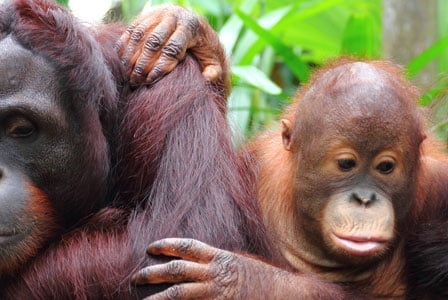
This Wildlife Wednesday, learn about the endangered orangutan – a close relative of humans that is gravely threatened by palm oil production.
This Wildlife Wednesday, learn about the endangered orangutan—a close relative of humans that is gravely threatened by palm oil production.
Habitat: Indonesia and Malaysia
Orangutan trivia
- The word “orangutan” is the Malay word for “person of the forest”—a very fitting name, considering how intelligent and closely related to humans these great apes are.
- Technically, the Borneo orangutan and the Sumatran orangutan are different species. Both are threatened.
- They are Asia’s only great ape and the world’s largest tree-climbing mammal.
- Orangutans have been known to live up to 60 years in captivity.
- One of their “calls,” meant to alert others of their presence, can be heard a whopping 1.2 miles (2 km) away.
- Orangutans are huge! Their arm span measures seven feet, which helps them easily maneuver through the trees in which they spend the majority of their time.
- They forage for food and aren’t overly picky—they eat fruit, leaves, bark, insects, and even meat on occasion.
- Unlike some other great apes, orangutans are relatively solitary. Males spend their time alone, but mothers and their young can stay together for up to seven years.
Why they’re threatened
Current events are putting the remaining orangutan population in grave danger, and believe it or not, palm oil may be the culprit—irresponsibly managed palm oil firms, to be exact.
According to news sources, massive forest fires and land clearing by palm oil companies could kill 200 orangutans in one Indonesian forest. Because of this, it is hypothesized that these Sumatran orangutans could perish within weeks.
Palm oil is used for everything from cooking to soap production and biofuel, and according to an organization called Borneo Orangutan Survival Australia, forests are being cleared at the rate of 300 football fields per hour for these palm oil plantations.
What you can do
- Learn more about palm oil’s environmental costs, when grown irresponsibly.
- Check out the World Wildlife Fund for more information (you can even sponsor an orangutan!).
Looking for more Wildlife Wednesday posts?
Check out these past posts:
- Sumatran tigers
- Leatherback sea turtles
- Przewalski\’s horse
- Vancouver Island Marmot



